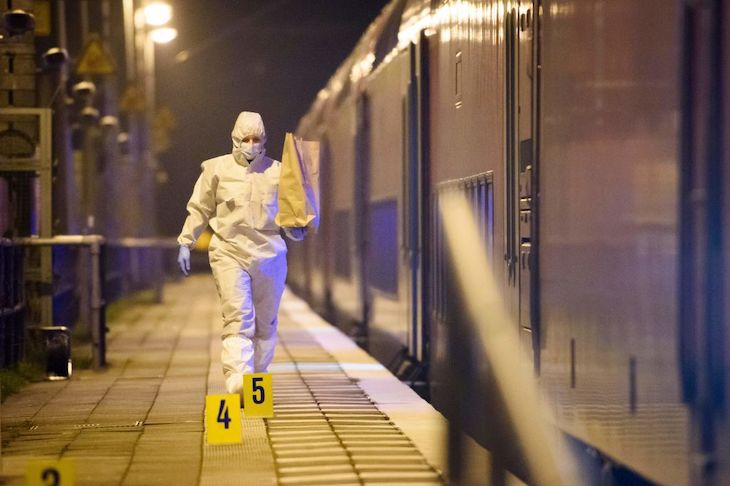Life in Europe is becoming increasingly precarious; a case of hoping it’s not your turn to be in the wrong place at the wrong time. In a Salisbury court on Monday a 21-year-old Afghan with a long history of violence was convicted of the brutal murder of Thomas Roberts; on Wednesday, a Palestinian allegedly stabbed two people to death on a German train.
That same day in Spain a Moroccan under a deportation order was arrested after a verger was killed with a machete and a priest badly wounded in two related attacks in the city of Algeciras. Meanwhile in France an Algerian and a Kosovan are in custody after two incidents earlier in the month, one in Paris and the other in Strasbourg, where knives were used to inflict terrible injuries on bystanders.
Europeans have been suffering these types of attacks since at least 2014. In that time hundreds of hands have been wrung by politicians, and thousands of words spoken, including many meaningless cliches about ‘learning lessons’. And to what effect?
Is it any wonder that no one believes a word this government says about illegal immigration?
In March 2018 Ahmed Hassan, an 18-year-old Iraqi refugee, was found guilty of attempting to detonate a bomb on the London Underground. After the verdict Ben Wallace, now the Defence Secretary but a security minister at the Home Office at the time, said that there were ‘lessons to be learned’ from the case. Surrey County Council, who had placed Hassan with foster parents, admitted that ‘our work with other agencies in this case wasn’t as good as it should have been and we’re sorry for our part in that’. There was also an apology from David Munro, the Police and Crime Commissioner for Surrey, who said that the failure to identify Hassan as a threat was ‘very worrying’.
Lessons are never learned. If they were, Lawangeen Abdulrahimzai would not have been able to murder Thomas Roberts in a Bournemouth street last year. That he did was because of the mistakes made by Home Office officials who believed his claim that he was 14 years old and allowed him to be placed into foster care without running thorough background checks which would have revealed he was a very dangerous individual who had been rejected by Norway.
What accounts for the inability of the Home Office and Border Force officials to protect its citizens? It may be incompetence, a thick seam of which seems to run through the Civil Service, but is it also intimidation from human rights organisations and much of the broadcast media.
There was much coverage recently of an exchange between Suella Braverman, the Home Secretary, and an 83-year-old Holocaust survivor. The confrontation was engineered by a small pressure group called Freedom From Torture, who filmed it and then sent out an edited version on social media. There is now an open letter on their website, which people are urged to sign in order to show ‘solidarity with refugees and people seeking asylum’.
To date, over 34,000 have signed the letter. Three years ago, 126,000 Britons signed a petition demanding that parliament put an end to illegal immigration, which required the topic to be discussed in the House. The outcome of which was a government promise in October 2020 to ‘strengthen borders, tackle organised immigration crime, overcome rigid legal barriers to removal, and overhaul the system’.
Given that a record 46,000 people crossed the Channel illegally into Britain last year, is it any wonder that no one believes a word this government says about illegal immigration?
Last month, YouGov canvassed opinion about the government’s immigration policy and 72 per cent of respondents criticised their handling of the issue; among Tory voters, 66 per cent said too many migrants were being allowed in.
The Tory percentage was mirrored in a recent poll in France on the same subject; asked if there were too many migrants in France, 66 per cent of Emmanuel Macron supporters responded in the affirmative. The figure stood at 97 per cent for Marine Le Pen voters and 82 per cent for those who identified as centre-right Republicans. A poll in Germany last month produced almost exactly the same proportion: 68 per cent of people said there was too much immigration.
Immigration featured prominently in last April’s presidential campaign in France. Macron admitted there was a problem, and he promised to address immigration and asylum ‘more rapidly and effectively’. Like the British government, Macron is proving spectacularly incompetent: figures released this week reveal that France welcomed a record number of migrants and asylum-seekers in 2022.
One of Le Pen’s campaign pledges last year was to hold a referendum on immigration. She wasn’t the only one to make such a promise. So did Xavier Bertrand and Michel Barnier, both Republican candidates, the latter familiar to Britons as the EU’s ‘suave’ Brexit negotiator.
He and Bertrand proposed to amend the constitution so Parliament had the right ‘to define annual quotas of foreigners authorised to enter France…according to the needs of French companies and the nationalities of their nationals’.
In fact, such a measure had first been mooted in 2008 during the presidency of Nicolas Sarkozy, and its feasibility was examined by Pierre Mazeaud, former president of the Constitutional Council. He concluded that ‘binding migration quotas would be unworkable’.
Unworkable, or unpalatable? If Australia can introduce a successful quota scheme, why can’t the EU?
In Britain, as in France, electorates have consistently voted for leaders who have promised to control immigration. But they have been betrayed by prime ministers and presidents too weak and too frightened – in the words of the British government in 2020 – to ‘strengthen borders, tackle organised immigration crime, overcome rigid legal barriers to removal, and overhaul the system’.
Their cowardice is exacting a terrible price on the people they are elected to protect.







Comments